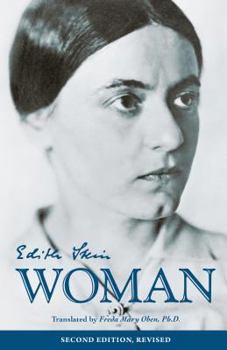Essays on Woman
Select Format
Select Condition 
Book Overview
With reason Edith Stein has been called the most significant German woman of the twentieth century. Her writings on woman are the fruit of both reflection and debate with other leaders of the Catholic... This description may be from another edition of this product.
Format:Paperback
Language:English
ISBN:0935216596
ISBN13:9780935216592
Release Date:January 1987
Publisher:ICS Publications
Length:291 Pages
Weight:0.80 lbs.
Dimensions:0.7" x 5.4" x 8.4"
Customer Reviews
3 ratings
Great Choice for Contemporary Philosophy Courses
Published by Thriftbooks.com User , 15 years ago
This book by Stein is a compelling synthesis of psychology, philosophy, history, and theology around the theme of the nature and vocation of women. I have used it in my Contemporary Women in Philosophy course, following Hannah Arendt and preceding Simone de Beauvoir. Students wrestle with the space Stein occupies--is she an essentialist or not? Does she relegate women to the home or encourage them to pursue vocations? As other reviewers have noticed, Stein is not necessarily easy to categorize. She lives the tension between being a professional philosopher and a Carmelite; she expresses the tension between history and tradition, between philosophy and theology. Students have noticed that Stein's views on education, on women's ordination, and on human personality development are consonant with phenomenology, particularly phenomenological psychology. Students have also pointed out that Stein's back and forth movement from tradition to history to analysis of human experience imitates Husserl's zig-zag movement of phenomenological description. I find that Stein's book is a wonderful counterpoint to later issues of gender theory. Students can begin to wrestle well with questions by later thinkers such as Butler and Kristeva when they use Stein as a model for the thinking that preceded them. Of course, Stein has her own value too, especially to a Catholic audience. I am very glad that I have read this book, and I will continue to use it if it remains in print.
A Woman of the Third Millenium in the End of the Second
Published by Thriftbooks.com User , 18 years ago
Edith Stein's views on womanhood are just beginning to be dissected by theologians in light of the popularity of Pope John Paul the Great's "Theology of the Body." She explores the vocation of men and women, in particular, by expanding upon Aquinas's 'anima forma corporis' in her discussions of `woman's soul'. She is quite candid about her beliefs: "I am convinced that the species humanity embraces the double species man and woman; that the essence of the complete human being is characterized by this duality; and that the entire structure of the essence demonstrates the specific character. There is a difference, not only in body structure and in particular physiological functions, but also in the entire corporeal life. The relationship of soul and body is different in man and woman; the relationship of soul to body differs in their psychic life as well as that of the spiritual faculties to each other" In her analyses, St. Edith Stein is uncompromisingly orthodox on the role of men and women in society and relation to each other. The Virgin Mary is highlighted as a model several times throughout the book. Interestingly, though, she highlights and expands more than any other writer that I have come across the strength, validity and necessity of spiritual maternity in all areas of life. In doing so, she vividly explores what John Paul II later termed "the feminine genius", though it is never labeled as such in her essays. She is infatuated with what is inherently feminine nature, and, in contrast, masculine nature, developing some psychological insights into female empathy that parallel Simon Baron-Cohen's findings in the 1990s. Stein explores practically every female vocation: marriage, the consecrated life, the professional life, singledom, and those who possess a "double vocation" of more than one of these. She also addresses women in political life, the public realm, universities and other areas of national life. She writes: "The singular mission of the working woman is to fuse her feminine calling with her vocational calling and, by means of that fusion, to give a feminine quality to her vocational calling." Edith Stein implicitly confirms the authority and Tradition of the Church, but also asserts the necessity for the development of doctrine, which potentially could incorporate her explications of femininity. As I mentioned above, these explications are completely orthodox. Stein argues, for example, a traditionally Catholic opinion that `the intrinsic value of woman consists essentially in exceptional receptivity for God's work in the soul". In addition, as an educator herself, a good portion of the essays focus on what should constitute a female education. Stein reveals some markedly progressive insights for her time on the choice and scope of female education. She argues against excessive specialization, favoring a global, holistic, and personalized approach to human society. Education requires "broad human and personal contact",
Woman by Edith Stein
Published by Thriftbooks.com User , 19 years ago
Provides a thought-provoking look at the spirituality of lay and religious Catholic women. Sure to be controversial, it's not the typical thing you hear from either feminists or anti-feminists, but quite uniquely it's own.





